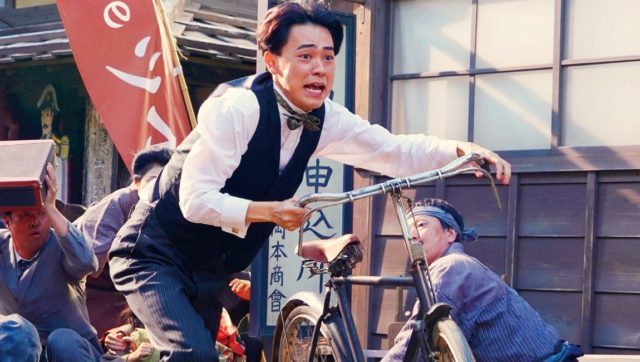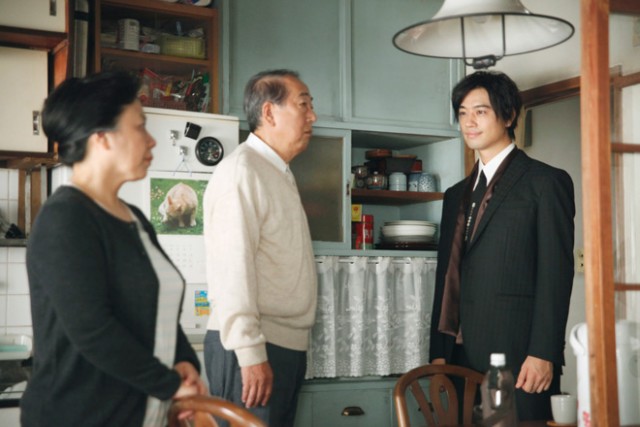
Masayuki Suo takes the audience on a wild ride in Talking the Pictures
FLASH FORWARD
Japan Society online and in-person
333 East 47th St. at First Ave.
December 3-23, free – $10 online for three-day rental, $15 in person December 11 & 17, 7:00
212-715-1258
www.japansociety.org
Japan Society and the ACA Cinema Project (Agency for Cultural Affairs, Government of Japan) follow up their inaugural festival, “21st Century Japan: Films from 2001-2020,” with “Flash Forward: Debut Works and Recent Films by Notable Japanese Directors,” running December 3-23 online and in person.
The three-week series highlights the work of six established Japanese directors, pairing their debut with a more recent film. Available on demand as a three-day rental for ten dollars or fifteen dollars per bundle are Naomi Kawase’s 1997 Cannes Camera d’Or-winning Suzaku and 2018 Vision, Miwa Nishikawa’s 2003 Wild Berries and 2016 The Long Excuse, Shuichi Okita’s 2009 The Chef of South Polar and 2020 Ora, Ora Be Goin’ Alone, Junji Sakamoto’s 1989 Knockout and 2016 The Projects (see review below), and Masayuki Suo’s 1989 Fancy Dance and 2019 Talking the Pictures. Akihiko Shiota’s 1999 Moonlight Whispers was supposed to be teamed up with his 2019 Farewell Song but will not be shown because of music rights issues; it has been replaced by his fourth film, the 2002 drama Harmful Insect.
The “Filmmakers on the Rise” section comprises recent works by six directors who might be part of “Flash Forward” if it were held again in 2040: Masakazu Kaneko 2016 The Albino’s Trees, Yuko Hakota’s 2019 Blue Hour, Omoi Sasaki’s 2017 A Boy Sato, Eisuke Naito’s Forgiven Children, Kyoko Miyake’s 2013 My Atomic Aunt, and Hiroshi Okuyama’s 2019 Jesus. These films are available for free on demand. Also free are two online talks, “Conversations with the Filmmakers,” with Kawase, Nishikawa, Okita, Sakamoto, Shiota, and Suo, and the panel discussion “Debut Works and Beyond,” with Columbia assistant professor Takuya Tsunoda, UCLA assistant professor Junko Yamazaki, and writer, curator, and filmmaker Jasper Sharp, moderated by Yale professor Aaron Gerow.
Two in-person screenings at Japan Society celebrate the late master Sadao Yamanaka, who made more than two dozen films in the 1930s, few of which survive, before dying in Manchuria in 1938 at the age of twenty-eight. On December 11 at 7:00, a new 4K restoration of Yamanaka’s 1935 Tange Sazen and the Pot Worth a Million Ryo will have its North American premiere, followed December 17 at 7:00 by the international premiere of the 4K restoration of Yamanaka’s 1936 Priest of Darkness.

Hinako (Naomi Fujiyama) and Seiji Yamashita’s (Ittoku Kishibe) lives change once again with the return of Shinjo (Takumi Saitoh) in The Projects
THE PROJECTS (DANCHI) (団地) (Junji Sakamoto, 2016)
film.japansociety.org
“Nothing is impossible in a housing project,” several people say in Junji Sakamoto’s delightfully absurdist and downright weird black comedy The Projects, which made its North American debut at Japan Society’s tenth annual Japan Cuts Festival in 2016. Elderly couple Hinako (Naomi Fujiyama) and Seiji Yamashita (Ittoku Kishibe) have moved to an inexpensive suburban Osaka housing project, known as a danchi, after closing their popular herbal remedies shop following the tragic death of their son, Naoya. The couple lives quietly, unable to process their grief or move forward, but they’re back in business when one of their strangest customers, the well-dressed, oddly speaking Shinjo (Takumi Saitoh), tracks them down and essentially demands, in his calm, direct manner, that they begin making his special remedy again. Meanwhile, Seiji, who would rather be left alone, is dragged into the race for head of the tenant association, running against Gyotoku (Renji Ishibashi), who is having an affair with a younger resident and is married to Kimiko (Michiyo Okusu), who is obsessed with properly separating the danchi’s garbage, and young upstart Yoshizumi (Takayuki Takuma), who is not afraid to discipline his son, Kitaro (Hiroaki Ogasawara), in full view of his neighbors. After Seiji loses, he decides to hide from everyone, retreating under the floorboards whenever someone stops by, which leads a gossiping group of ladies (Hikaru Horiguchi, Yukari Taki, Mayu Harada, Mari Hamada, and Miyako Takeuchi) to believe that Hinako has actually killed her husband and chopped up the body. As the media and police get involved, things get crazier and crazier as the totally bizarre conclusion approaches.
Fujiyama and Kishibe are absolutely charming as the Yamashitas, moving and talking with a sweetly warm, slow demeanor, asking little from a life that has let them down. Sakamoto wrote The Projects specifically for comedian and stage actress Fujiyama; the two last worked together on the award-winning 2000 film Face, Fujiyama’s first film, and the pairing is another marvel. Fujiyama is wonderful in the role, imbuing Hinako with a wry, very funny sense of humor that is splendidly complemented by Kishibe’s more serious Seiji. Lovingly shot by Ryo Ohtsuka and featuring a playful score by Gorô Yasukawa, The Projects is pure fun all the way through, with many laugh-out-loud moments even as it deals with some heavy subjects, right up to its out-of-this-world finale. Don’t let the title fool you; “projects” in Japan were much-desired apartment complexes originally built in the 1950s to supply suburban public housing for the growing post-WWII Japanese population. Although they are not as popular today, they are not the kind of projects associated with drugs and crime in America. The Projects is paired with Sakamoto’s 1989 debut, Knockout (Dotsuitarunen), in “Flash Forward: Debut Works and Recent Films by Notable Japanese Directors.”